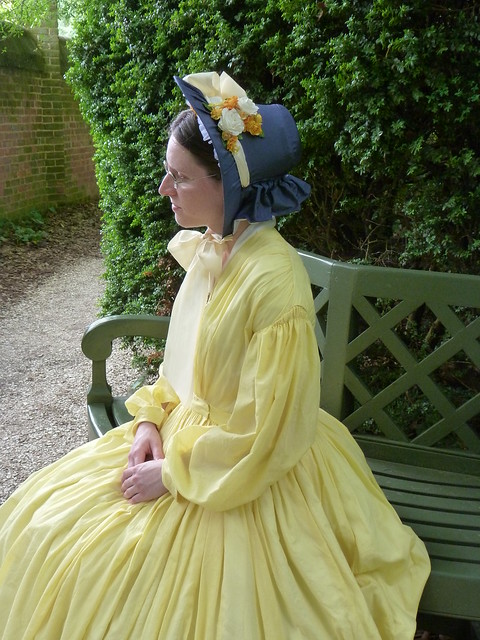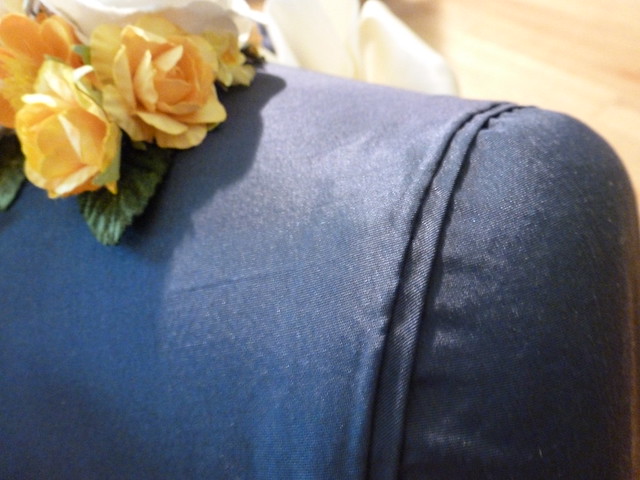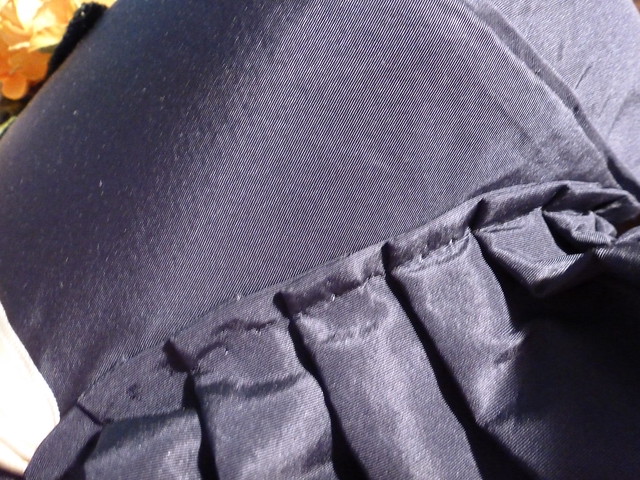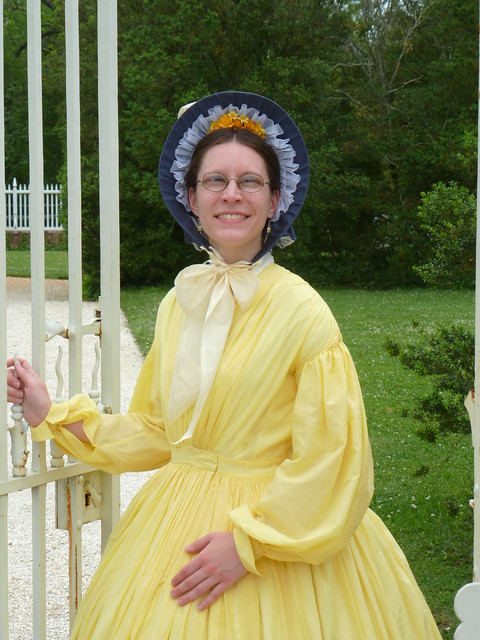A Blue Silk Bonnet, early 1860s
Colonial Williamsburg, May 2012.
This was my first attempt at wire-and-buckram millinery (apart from the brim of my 18th-century bonnet, which I don't count because it wasn't very complicated!), and I couldn't be more pleasantly surprised with how it turned out. I finished the bonnet before I finished the dress and Ashley loved it so much, she started just randomly wearing it around the house with her modern clothes. I wish I had gotten a picture of
that...:-)
The pattern: Timely Tresses's Eliza Coretta early 1860s bonnet. When I first started laying things out and reading the instructions, it seemed a bit complicated, but once I got started, everything went together surprisingly easily. I highly recommend the pattern!
Construction process: As with the dress in the previous "Threaded Bliss" installment, because I used a pattern, I can't go into very specific construction details, but I'll give a quick overview of how things went together both beneath and above the silk.
The piped edge of the tip.
Everything on the bonnet - including the form beneath - is sewn by hand. The bonnet shape is formed of wire and buckram, with a blocked tip inserted into the back. The form is then covered in silk from back tip (the edge of which is piped, like many original bonnets), to the crown, to the brim. After the top is decorated, the interior is lined and then the front inside of the brim is trimmed and the ties sewn on.
The curtain (bavolet), like most in the period, is lined with cotton netting to help keep it clean from the oils of the hair and to help give it a bit of structure as it falls down the back of the neck. It is pleated and topstitched on the outside, though bavolets were also just as frequently attached "inside-out" and then flipped so that no stitching would be visible on the exterior.
Top-stitched bavolet.
The flowers are made of paper and arranged on the left side of the headpiece, asymmetrical trimmings being the most popular in the early 1860s. A big bow of wide ivory moire ribbon helps balance the look a bit on the opposite side of the headpiece.
 A view of the top of the bonnet.
A view of the top of the bonnet.
The interior of the bonnet's brim is decorated with very fine cotton netting and a small bunch of yellow flowers that bring the yellows from the back of the brim to the front.
 Fine cotton netting and a small bunch of flowers decorate the
inside of the brim to frame the face.
Fine cotton netting and a small bunch of flowers decorate the
inside of the brim to frame the face.
Colonial Williamsburg, May 2012.
The bonnet ties with two sets of ties. The wider ivory moire ribbon, with the lovely big bow it makes when tied under the chin, is purely decorative. Hiding beneath it, sewn to the inside of the bonnet's points, is a set of utility ties of ivory silk satin. These are the functional ties that take all of the tension and help hold the bonnet on the head.
The fabric: A dark royal blue silk taffeta. The bonnet is trimmed with wide ivory moire ribbon and paper flowers. The utility ties are ivory silk satin.
Colonial Williamsburg, May 2012.








5 comments:
Very pretty! Did you make the paper flowers as well? Yellow and blue have always been a favorite color combo of mine!
-Emily
Oh no, I didn't make the paper flowers! I wish I knew how to do that, but alas I don't. We purchased these from a couple of different etsy and ebay sellers.
I love the blue and yellow together, too. It's made me really, really want to do an 18th century outfit with that combination now!
Where is your profile picture from? It's perfectly posed and framed with the flowers in the background. Just gorgeous!
Your bonnet is gorgeous! I always buy the ready made frame from this particular vendor, but have not had the courage to attempt the kits. I'd asked previously how you like Robert Land Balmoral boots, but somehow my question didn't wind up in your comment section. I am thinking of purchasing a pair for myself and am interested in hearing an honest opinion from a person who owns one before taking the plunge.
The picture for my profile was taken in one of the gardens in Williamsburg last spring. I can't remember which one though.
The blue with the yellow dress if very pretty. I'd never thought to do piping on a hat but that gives it some extra interest on it. I might have to try that next time I trim one.
Val
Post a Comment